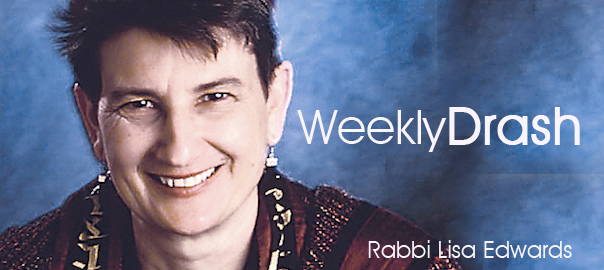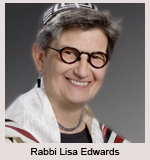An Attitude of Gratitude – Parashat Vayeitzei [Shabbat Thanksgiving 2012]

By Rabbi Lisa Edwards
Yesterday was Thanksgiving. A day intended from early on to be a day of gratitude. But we often know Thanksgiving as a punchline to jokes about family dysfunction and fights breaking at shopping malls as day after Thanksgiving sales whip shoppers into a frenzy. And perhaps some of you experienced yesterday or today more that way than as a day of giving thanks.
But the idea of giving thanks, that’s a very Jewish idea.
Although our Torah contains many stories of Jews trying to talk God out of something or into something, the prayers in our prayer books are less about deal making and more about please and thank you and wow, God, You’re amazing.
 In formal prayer we try to be practical and polite. Practical as in we only offer prayers asking for rain during the rainy season. Polite as in, when we pray for healing we say,
In formal prayer we try to be practical and polite. Practical as in we only offer prayers asking for rain during the rainy season. Polite as in, when we pray for healing we say,
El na rafa na la/lo — “Please, God, heal her/him, please.”
And we are polite and practical in another way too — except for the prayers for healing, we try to give God Shabbat off too — so if you look through our prayerbook you’ll see that most prayers we recite on a typical Friday night fall under the categories of “thank you” or of “praise” and not so much under the category of “please.”
Despite our polite and practical prayers, though, I think Jews think of ourselves as complainers. We have a long, if not always proud history of complaining — the Israelites wandering in the desert complaining about the food. The Jewish joke where the waiter comes over to the table of Jews in the middle of their meal and says, “Is anything ok?”
And it’s not just complaints about food, we have other more admirable moments of complaint too — Abraham debating with God over the fate of the residents of Sodom and Gomorrah, for example — “Far be it from You to do such a thing,” Abraham says to God who is threatening to wipe out everyone in both of these cities, “killing the innocent and wicked alike, so that the innocent and the wicked suffer the same fate. Far be it from You! Must not the the Judge of all the earth do justly?” [Gen. 18:25]
Or Moses who time and again implores God NOT to lash out in anger against the Israelites [see Exodus 32:11f, for example].
In this week’s Torah portion, Vayeitzei, Jacob — the third generation of our ancestors — makes a pact with God. If it’s not a complaint exactly, it also doesn’t contain a “full faith” clause:
“IF God is with me and watches over me on this path that I am walking, im yih-‘yeh elohim imadi ushmarani ba-derekh ha-zeh asher anokhi ho-lekh
says Jacob, AND gives me bread to eat and clothes to wear, and I return safely to my father’s house, THEN Adonai will be my God.” [Gen. 28:20-21]
I can forgive Jacob some — he ran away from home alone because his brother, Esau, was wanting to kill him; he and his mother had recently tricked his father into giving Jacob a blessing meant for Esau (no wonder Esau was angry); Jacob had no idea what fate lay before him. And yet, I also question his conditional pact with God – for Jacob makes this conditional vow immediately after his famous dream in which he sees angels going up and down on a ladder set on the ground with its top reaching to heaven [Gen. 28:12-15]. The same dream in which he sees God standing above the ladder, saying to him, “v’hineh anochi ee-makh, here I am, with you: I will watch over you wherever you go…I will not let go of you as long as I have yet to do what I have promised you.” [28:15]
At the moment of waking from the dream Jacob seems to feel secure:
“Truly, God is in this place, and I, I did not know it!” he famously says,
but moment’s later he’s making his conditional pact.
After a dream like that, why did Jacob need to set conditions for God? Why not a full on THANK YOU, God, for promising to be with me, or thank You for allowing me a comforting dream while I am alone and lonely in a deserted place — with a difficult past behind me and
an uncertain future ahead of me.
Here’s what I suspect about Jacob and, in fact, about a lot of us:
We forget to take God along with us all the time.
When Jacob awoke from his amazing dream, Jacob thought the place he had the dream was the special place — he even called it, Beth El – the house of God. He picked up the rock he had used as pillow and said, “Truly God is in this place and I did not know it,” instead of taking to heart that in his dream God told him “I will be with you every place you go.”
How different might Jacob’s life — filled with difficulty until the end — How different might Jacob’s life have been had he awakened from his dream and said, “Truly, God is in this place [touch your heart], this place [touch your head], and I, now I know it!”
On this day after Thanksgiving and forever after, may we learn to give thanks for all the many blessings — and may we use them — as God would surely have us use them — for good.
Shabbat shalom
___________________
1 Besides the story of the Pilgrims and the first Thanksgiving at Plymouth in 1621,
President of the United States George Washington proclaimed the first nation-wide thanksgiving celebration in America marking November 26, 1789, “as a day of public thanksgiving and prayer to be observed by acknowledging with grateful hearts the many and signal favours of Almighty God”.




